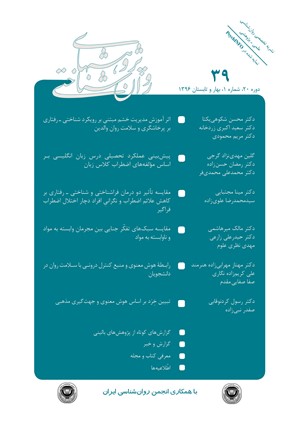تبیین خِرَد بر اساس هوش معنوی و جهت گیری مذهبی
محورهای موضوعی :
1 - دانشگاه بوعلی سینا همدان
کلید واژه: خرد هوش معنوی جهت گیری مذهبی,
چکیده مقاله :
هدف از مطالعۀ حـاضر، بررسي نقش تبیین کنندگیِ هوش معنوی و جهت گیری مذهبی در سازة خِرَد بود. روش پژوهش حاضر، توصیفی و از نوع همبستگی است. شرکت کنندگان اين مطالعه را 120 نفر از دانشجویان دانشگاه بوعلی سینا تشکیل می دادند. در این مطالعه، ابزارهای پژوهش عبارت بودند از مقیاس جهت گیری مذهبی (SAWS)، مقیاس هوش معنوی (SII)، و سه مقیاس سنجش خِرَد شامل مقیاس سه بعدی خرد (3D-WS)، مقیاس ارزش های بنیادین (FVS)، و مقیاسِ از خودفراروی (ASTI). براي تحليل داده ها، از آزمون های همبستگی پیرسون و رگرسيون چندگانه استفاده شد. نتایج نشان می دهند که در مقیاس سه بعدی، ترکیب مؤلفه های هوش معنوی و جهت گیری مذهبی 20% از واریانس خِرَد را تبیین می کنند. دیگر مقیاسهای خِرَد با جهت گیری مذهبی ارتباط معناداری ندارند اما ارتباط آنها با هوش معنوی معنادار است.
Abstract: The aim of the present study was to investigate the role of spiritual intelligence and religious orientation in explaining wisdom construct. Method of the present study was descriptive and correlational. Participants were 120 students of Bu-Ali Sina University, Hame-dan. The measures of Religious Orientation, Spiritual Intelligence Inventory, and three scalese of wisdom including Three-Dimensional Wisdom Scale (3D-WS), Adult Self-Transcendence Inven-tory (ASTI), and Fundamental Values Scale (FVS) were used. Multiple regression and Pear-son’s correlation methods were used to analyze the data. The results showed that in 3D-WS, the combination of components of spiritual intelli-gence and religious orientation explains 20 per-cent of wisdom’s total variance. No other signi-ficant relationships were found between other scales of wisdom and religious orientation; how-ever, they were significantly associated with spiri-tual intelligence.


